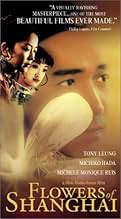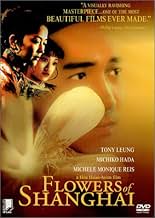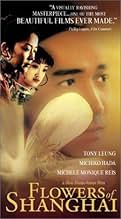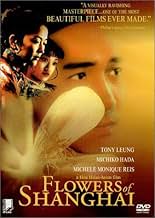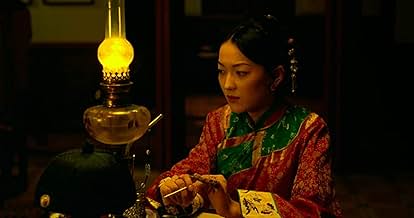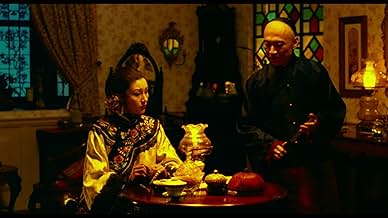AVALIAÇÃO DA IMDb
7,3/10
4,4 mil
SUA AVALIAÇÃO
Adicionar um enredo no seu idiomaIn the "flower houses" (upscale brothels) of Shanghai, various interweaving stories of love, loyalty, and deceit play out subtly.In the "flower houses" (upscale brothels) of Shanghai, various interweaving stories of love, loyalty, and deceit play out subtly.In the "flower houses" (upscale brothels) of Shanghai, various interweaving stories of love, loyalty, and deceit play out subtly.
- Direção
- Roteiristas
- Artistas
- Prêmios
- 6 vitórias e 6 indicações no total
Tony Leung Chiu-wai
- Wang Lingsheng
- (as Tony Chiu Wai Leung)
Michelle Reis
- Emerald
- (as Michelle Monique Reis)
Carina Lau
- Pearl
- (as Carina Lau Ka-ling)
Rebecca Pan
- Huang
- (as Rebecca Pan Wan-ching)
Tony Chang
- Peking Opera Actor
- (as Tony Chang Ruei-che)
Yiu-Ming Lee
- Azhu
- (as Yu-ming Lee)
- Direção
- Roteiristas
- Elenco e equipe completos
- Produção, bilheteria e muito mais no IMDbPro
Avaliações em destaque
The Taiwanese writer-director Hou Hsiao-hsien is regarded by many as the greatest living filmmaker, and FLOWERS OF SHANGHAI is widely considered one of the strongest contemporary movies. Hou's approach is both anthropological and highly formalized: this examination of the economics and Machiavellian power politics of a Shanghai brothel in the mid-1800's stays remote. The feeling is sometimes that of a news crew eager not to intrude, but the mise-en-scene evokes the mastery of space-carving in Kurosawa's HIGH AND LOW or Bresson's UNE FEMME DOUCE. Shot in wide, mobile masters that go on for four or five minutes at a stretch, FLOWERS is theatrical in the extreme, and, as in a Yuan drama or a Kun opera, Hou stays at a more than respectful reserve from his characters. For some, this spells high-art elegance; others may feel starved for vividness and human immediacy, and wish the film to end far sooner than it does.
At the end of the 19th century, Chinese officials used to spend their leisure time in lush brothels in the British concession of Shanghai. Hou Hsiao-Hsien's 'Hai Shang Hua' depicts the intricate social network sustained in those premises by the customers, the girls (called flowers) and the Madams. The personal relations in those brothels were ruled by pleasure, money, love and social status in a perfect parallel to the 'outside' society, which, in turn, is perceived throughout the film almost as unreal. Hou is a master creating ambiences: the film transmits an extraordinarily subtle feeling of warmth and suffocation fostered by a miraculous music. With neither a beginning nor an end, this superb film is not apt for those looking for adventures and easy-to-tell stories.
10pcg
This hypnotically beautiful film may recall a dream, but the material world of money and power, indentured servitude and beatings everywhere intrudes on it. We discover in the contrasting stories of Emerald, Pearl, Crimson, Jade, and Crystal, how some survive as "flower girls" and others are crushed. Far from being boring or cold, the film is compelling dramatically and emotionally. "Flowers of Shanghai" seems to contain boundless reserves of sadness and rage -- it is as if the sex and violence are not on screen because Hou cannot bear to show them. If "Flowers of Shanghai" is an opium dream, as many have said, the opium is both bringing pleasure and suppressing pain.
"Flowers of Shanghai" shows compassion for its characters, both the innocents and those who survive through cynical manipulation. The scene-length takes in medium shots work to establish respect for each person within the film, while at the same time bringing about a kind of "rectification of names," systematically exposing the hypocrisy of the brothels. It's appropriate that one of the few moments of violent action in the film occurs when Master Wang smashes the exquisite interior decoration in a room: "Flowers of Shanghai" shows the seductive beauty of the brothel then reveals it to be a cage. Everyone in the film is on multiple levels unfree: the women are financially bound to the brothels and dependent on the whims of their clients, and almost everyone is addicted to opium.
The film never leaves the brothels. This expresses how the brothels in fact own the women. However, as Stephen Teo noted in CinemaScope, there's another detail that's easy to overlook: the women's bound feet prevent them from easily walking more than a few feet.
"Flowers of Shanghai" shows compassion for its characters, both the innocents and those who survive through cynical manipulation. The scene-length takes in medium shots work to establish respect for each person within the film, while at the same time bringing about a kind of "rectification of names," systematically exposing the hypocrisy of the brothels. It's appropriate that one of the few moments of violent action in the film occurs when Master Wang smashes the exquisite interior decoration in a room: "Flowers of Shanghai" shows the seductive beauty of the brothel then reveals it to be a cage. Everyone in the film is on multiple levels unfree: the women are financially bound to the brothels and dependent on the whims of their clients, and almost everyone is addicted to opium.
The film never leaves the brothels. This expresses how the brothels in fact own the women. However, as Stephen Teo noted in CinemaScope, there's another detail that's easy to overlook: the women's bound feet prevent them from easily walking more than a few feet.
I saw this film at Cannes where delegates, including would-be intelligent critics emerged from the film scratching their heads and mumbling 'interesting' - a sure sign that they couldn't understand a word of it. For me it had been an epiphanous experience.
Six months later Cahiers du Cinema voted it the best film of its year...
I am sure there is a word to describe the effect of the film, but I can't lay my hand on it, so I will say 'emotionally disjoint'. As the men sit around playing Mah Jong talking, generally of trivia, huge emotional dramas are going on, but obliquely, in relation to the girls in the brothel. The effect is crushing.
I thought, while watching, mainly of Jean-Marie Straub as it has a minimalist side, but with such greater emotional power and resonance. It is so tragic that this magnificent film has had such a poor release in the west - no theatrical distribution at all in the UK...
Six months later Cahiers du Cinema voted it the best film of its year...
I am sure there is a word to describe the effect of the film, but I can't lay my hand on it, so I will say 'emotionally disjoint'. As the men sit around playing Mah Jong talking, generally of trivia, huge emotional dramas are going on, but obliquely, in relation to the girls in the brothel. The effect is crushing.
I thought, while watching, mainly of Jean-Marie Straub as it has a minimalist side, but with such greater emotional power and resonance. It is so tragic that this magnificent film has had such a poor release in the west - no theatrical distribution at all in the UK...
"Flowers of Shanhai" is a stunningly beautiful film, elegantly visualized and intriguingly scripted. It explores not only the conflicts between individuals, but also issues of gender and class, and the way in which the people in power find their lives eroding under the influence of opium, foreign currency, and the buying and selling of sexual favors and social influence. The intricate connections between older and younger businessmen, older and younger courtesans, masters, mistresses, and servants, and people of differing degrees of wealth and influence, are all examined as prostitutes try to buy their freedom, or find reasons for staying in the brothels even when someone wants to buy their freedom for them, and as both men and women fix themselves on paths to self-destruction.
Calling it too slow paced for a modern audience rather misses the point. Certainly there aren't many car chases or gunfights in it, and if one defines pace only in terms of physical action, it might be fair to call it slow. For audiences with an attention span of longer than 60 seconds and an interest in psychological action rather than physical action, it moves right along. In fact, I found myself having to rewind and view several scenes again because they developed too fast for me to follow as I took in the subtitles. I was very pleased at its lack of Hollywoodism. It's the kind of film "Age of Innocence" might have been if "Age of Innocence" had relied more on acting and less on posing in its cultivation of emotional intensity. In "Flowers of Shanhai," melodramatic action is depicted as a weakness displayed by characters, rather than being exploited as a way of sustaining the audience's interest in a character-based story in which the director has no confidence.
Calling it too slow paced for a modern audience rather misses the point. Certainly there aren't many car chases or gunfights in it, and if one defines pace only in terms of physical action, it might be fair to call it slow. For audiences with an attention span of longer than 60 seconds and an interest in psychological action rather than physical action, it moves right along. In fact, I found myself having to rewind and view several scenes again because they developed too fast for me to follow as I took in the subtitles. I was very pleased at its lack of Hollywoodism. It's the kind of film "Age of Innocence" might have been if "Age of Innocence" had relied more on acting and less on posing in its cultivation of emotional intensity. In "Flowers of Shanhai," melodramatic action is depicted as a weakness displayed by characters, rather than being exploited as a way of sustaining the audience's interest in a character-based story in which the director has no confidence.
Você sabia?
- CuriosidadesThe film consists of 38 long shots.
- ConexõesFeatured in Hai shang chuan qi (2010)
Principais escolhas
Faça login para avaliar e ver a lista de recomendações personalizadas
- How long is Flowers of Shanghai?Fornecido pela Alexa
Detalhes
Contribua para esta página
Sugerir uma alteração ou adicionar conteúdo ausente

Principal brecha
By what name was Flores de Xangai (1998) officially released in India in English?
Responda

